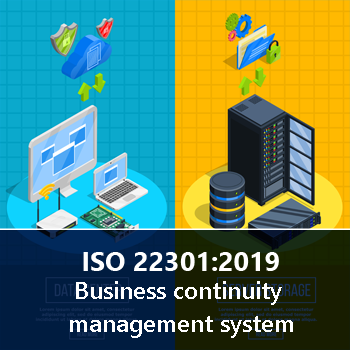What is the role of a business continuity professional and why you should consider this career path?
Published on November 02, 2024

In today’s environment, disruption can occur in countless ways, from natural disasters to cyberattacks, supply chain disruptions, or unexpected global events like pandemics. Adding to this complexity, artificial intelligence (AI) has become a powerful tool for both innovation and potential threats, presenting new avenues for motivated and resourceful attackers. To navigate these potential crises, organizations are increasingly seeking a structured approach in the form of a Business Continuity Management System (BCMS). Implementing a BCMS not only mitigates risks but also enhances resilience, helping companies stay operational in times of unexpected disruption. This article explores the benefits and challenges of BCMS implementation and highlights the importance of becoming a business continuity professional.
What is ISO 22301?
ISO 22301 is an international standard with requirements for Business Continuity Management Systems (BCMS). It provides a framework that helps organizations prepare for, respond to, and recover from disruptive incidents. The primary objective of ISO 22301 is to ensure that businesses can continue critical operations during and after an emergency or disruptive event. This structured approach is beneficial for organizations of all sizes and across industries.
Key benefits of implementing a BCMS according to ISO 22301
- Enhanced resilience and preparedness
By following the requirements of ISO 22301, organizations can build a robust BCMS that strengthens their ability to withstand disruptions. For instance, a manufacturing company can set up alternative supply chains and backup facilities, ensuring production continuity even if a primary supplier becomes unavailable. This proactive approach to resilience not only prepares businesses for crises but also gives them a competitive edge by reassuring clients, partners, and stakeholders of their reliability. - Improved response and recovery time
An effectively implemented BCMS enables quick response and faster recovery from incidents. With predefined processes in place, teams can act decisively, reducing downtime and minimizing financial and reputational damage. For example, in the event of a cyberattack compromising IT systems, a BCMS guides IT and security teams in securing data, notifying stakeholders, and restoring services, mitigating the impact on business operations. - Safeguarding reputation and customer trust
Organizations that handle disruptions well are more likely to retain customer trust and loyalty. ISO 22301 certification demonstrates a commitment to risk management and continuity, providing clients and partners with confidence in the organization’s resilience. For instance, during a power outage, a retail business with backup systems and clear customer communication can keep customers informed and satisfied, protecting its reputation. - Compliance with legal and regulatory requirements
For industries where downtime could pose significant safety, health, or economic risks—such as healthcare, finance, and critical infrastructure—ISO 22301 supports regulatory compliance. In these sectors, lack of preparedness can lead to fines or legal repercussions, making a BCMS essential. Financial institutions, for example, are often required to demonstrate continuity measures to protect client data and transactions. - Minimizing financial losses
Disruptions often lead to direct and indirect costs, including lost revenue, damaged assets, and increased operational expenses. By identifying potential threats and preparing for them, companies can reduce the financial impact of incidents. For example, an e-commerce company with a BCMS can quickly reroute shipments during logistical delays, minimizing revenue loss and additional costs. - Competitive advantage
ISO 22301 certification can help a business stand out in the market. Demonstrating preparedness can attract clients or partners who value stability and risk management. A logistics company with a strong continuity plan, for instance, may secure contracts with clients concerned about supply chain reliability. - Employee awareness and confidence
Regular training on continuity plans and crisis response boosts employee confidence and creates a proactive culture of awareness. Staff members who understand procedures for disruption are more likely to respond calmly and effectively. This is crucial in sectors where employees must act quickly and make informed decisions, such as aviation, emergency services, and customer support.
Risks and downsides of ISO 22301 implementation
While the benefits of implementing a BCMS are substantial, organizations should be aware of potential challenges:
- Initial investment and maintenance costs
Establishing a BCMS requires investment in planning, resources, and training, which can be challenging for smaller companies. Maintenance costs include regular testing, documentation updates, and staff retraining. Without a clear return on investment (ROI) strategy, the expenses may seem difficult to justify for organizations on tight budgets. - Risk of over-complexity
Companies in complex industries may inadvertently create intricate continuity plans that are hard to execute in real scenarios. An overly complicated plan can be overwhelming during a crisis, so simplifying the BCMS to focus on critical areas ensures that it remains practical and actionable. - Dependence on regular testing and updating
A BCMS is only effective if it’s up-to-date. If continuity plans are not regularly tested and revised, they may fall short during a real disruption. Maintaining a BCMS can be particularly demanding for organizations that undergo frequent changes in operations, technology, or personnel. - Employee resistance to change
Implementing a BCMS often involves changes in workflows, responsibilities, and additional training, which can meet resistance from employees. Some may view continuity planning as unnecessary, especially if they’ve never experienced a major disruption. Gaining employee buy-in is crucial to keep everyone engaged and invested in the continuity plan.
The importance of becoming a professional in business continuity management
With the increasing demand for effective business continuity measures, professionals skilled in BCMS are becoming indispensable. Whether as a practitioner responsible for implementing and improving a BCMS or as an auditor assessing compliance with ISO 22301, expertise in BCMS is essential for creating resilience in today’s unpredictable environment.
Why become a BCMS practitioner?
BCMS practitioners play a crucial role in ensuring all parts of an organization are prepared for and capable of managing disruptions. They assess risks, analyze potential business impacts, and develop continuity plans. Staying updated with continuity practices and technologies enables practitioners to help organizations achieve ISO 22301 certification and maintain readiness.
The value of BCMS auditors
Auditors assess whether an organization’s BCMS meets ISO 22301 standards, offering insights, identifying improvements, and ensuring compliance. As more organizations seek ISO 22301 certification to build stakeholder trust, the need for skilled auditors with a deep understanding of ISO 22301 grows.
Career benefits
A BCMS professional gains career opportunities across sectors. As industries invest in continuity measures, demand for BCMS expertise continues to rise. ISO 22301 certification is internationally recognized, enhancing career prospects worldwide.
Impacting organizational stability and public trust
BCMS practitioners and auditors play a pivotal role in protecting organizational stability, jobs, and even lives. They contribute to public trust in reliable, resilient organizations, making BCMS expertise a rewarding career path.
Final thoughts
If you’re interested in learning more about business continuity management and ISO 22301, consider exploring our online course. This course offers foundational BCMS knowledge, helping you contribute to organizational resilience.
For those already familiar with BCMS, we offer certification programs tailored for professionals. Our certifications for ISO 22301 Practitioners and ISO 22301 Auditors validate your expertise and support your career advancement in business continuity management.


